A vast, diverse continent, religion, and mythology across Africa is rich and vibrant. The African gods and goddesses that make up these belief systems are worshipped in many ways by millions of people around the world.
The Yoruba religion, which is today found throughout Southern Nigeria, forms the basis of many religions practiced by members of the African diaspora. These gods and goddesses are some of the more well-known in Africa yet some of the lesser known by people of the the rest of the world.
A detailed list of all the African gods and goddesses would be endless, but these twelve from the Orisha Pantheon are a good place to start.
Table of Contents
Eshu: the Divine Trickster
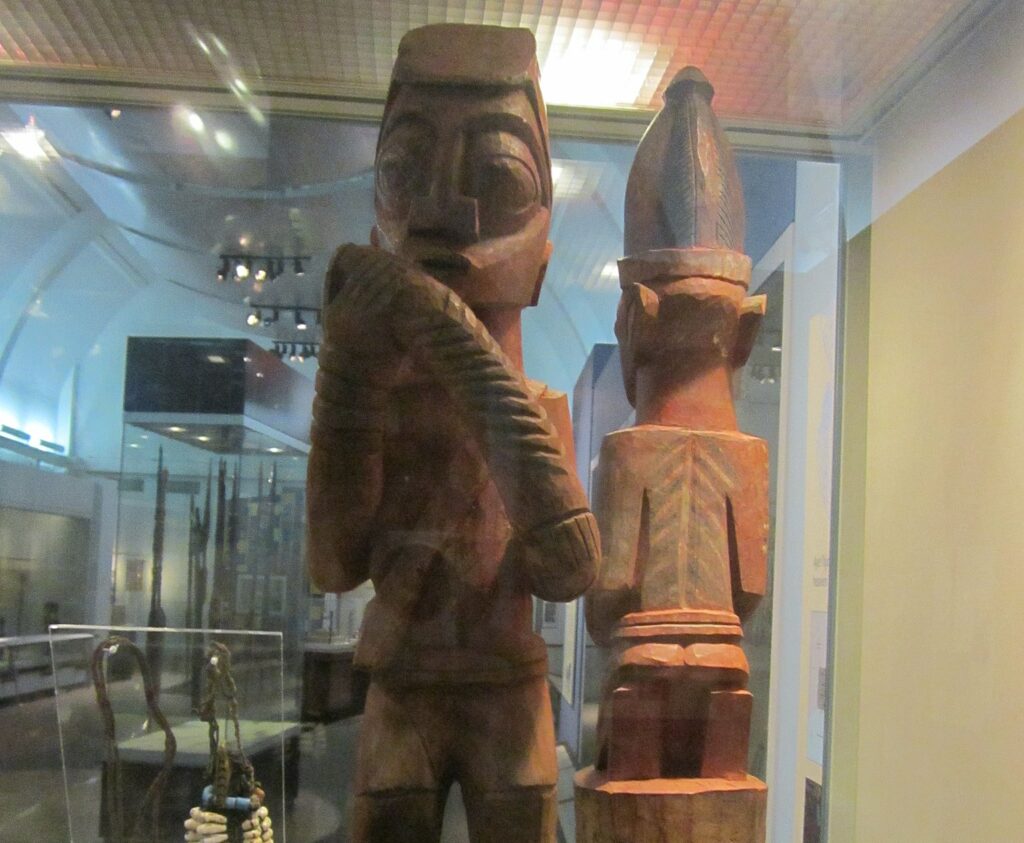
Mischief is something that doesn’t go unnoticed in African mythology in general. Trickster gods are present in many cultures around the world. It is something that adds that bit of extra tanginess to a stew of divine righteousness.
When mischief and trickery can be converted into an orb of power controlled by a celestial spirit, it makes way for a relatively powerful narrative that strikes awe within its believers.
Eshu, otherwise known as Elegba, is the Trickster of the Orisha Pantheon. He is the benevolent version of Loki in African mythology and a wandering trickster spirit generally concerned with probability and elusiveness.
By Western interpretation of Eshu, though, he is not seen as this malicious spirit doomed to destroy humanity through psychological trickery. Instead, he has solidified his position as a messenger between the realm of spirits and humankind, not unlike the Greek god Hermes.
He is not depicted as the devil himself. Still, He is believed to be more than capable of bringing adversity to those that do not take note of his presence. On the other hand, he requires sacrifices of resources such as tobacco to ensure constant appeasement and protection of human spirits.
Ogun: the Master of Iron
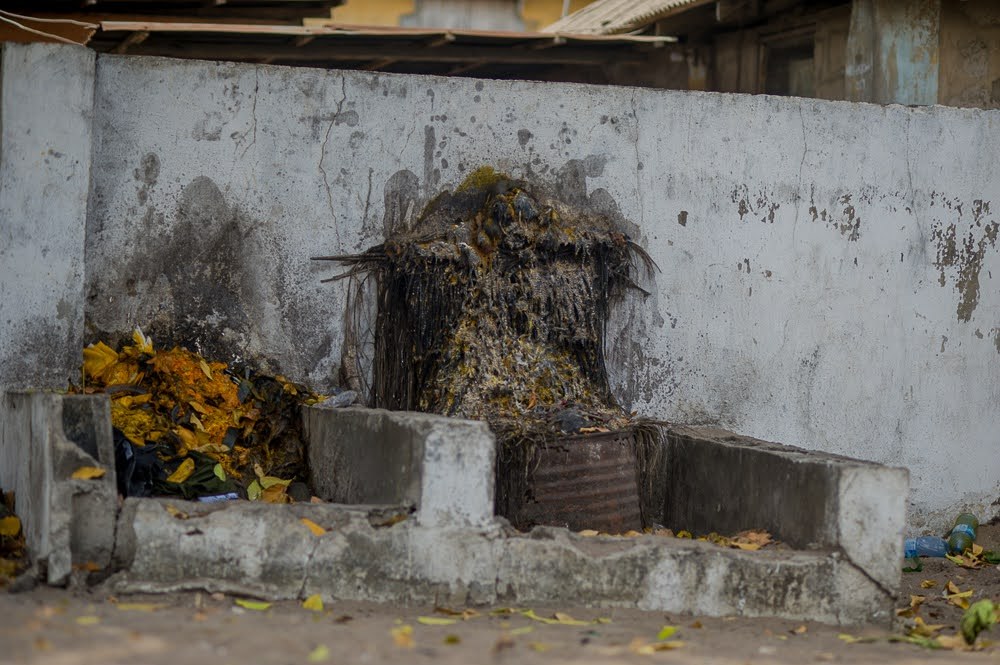
No settlement can be complete without an armory. An armory provides the means to defend oneself from the dangers of the outside world. This defense was a top priority in a hostile place like West Africa.
And what better tool to carry it out than the trusty old iron?
Being abundant in the region, iron was a vital resource. Hence, the material having a specific personality induced a sense of wonder and natural instinct among those who believed in its smithing magic.
Ogun is the Giver of Iron in the Orisha Pantheon. Alongside mastering the delivery of this world-building resource, Ogun is also dubbed the Warrior God of War. Wielding weapons of fine craftsmanship, Ogun oversees metalwork and conflicts that arise within the Yoruba people.
However, he refuses to interfere in what individuals choose to do with the weapons he blesses the productions of. The destiny of the weapon is left in the hands of the human who possesses it. This is an ode to Ogun’s double-edged sword, representing two sides of justice.
Being garbed in red, Ogun represents aggression in one narrative. Hence, his being is deeply rooted in the Yoruba people’s psychology. As a result, he stands as one of the crucial Orishas in the pantheon.
Shango: the Bringer of Thunder
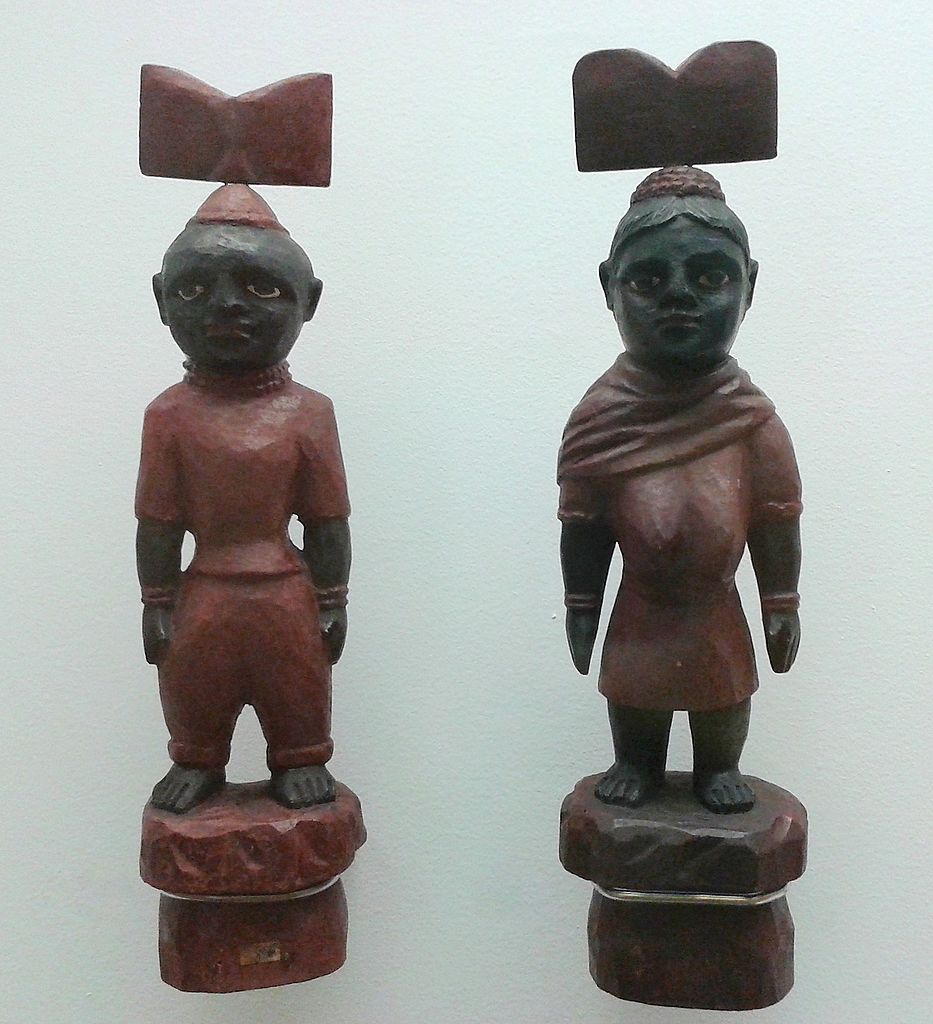
Modern people often underestimate the might of a crackling burst of thunder. During ancient times, a slap of thunder signaled the onset of danger, or the gods’ wrath hurtling down from the heavens.
In the Orisha pantheon, the supreme god meant existence through Olodumare, and the Yoruba storm god Shango was its bane. Filtering the very essence of wrath and fury, he was the bringer of thunder and brimming masculinity.
Sharing a commonplace with other famous gods such as the Greek Zeus and the Norse Thor, his prowess remained dominant with a chaotic sky. Shango directs the destination of thunder and lightning depending on what goes on in the world down below.
His authoritative use of raw power symbolizes typical masculinity, linking him to a more personal viewpoint for followers of the Orisha pantheon.
This power is often connected to dances conveying threatening gestures in rituals dedicated to this thunderous deity.
Shango has three wives, Oshun, Oya, and Oba. They are all mentioned within this list.
Oshun: the Mother of Rivers
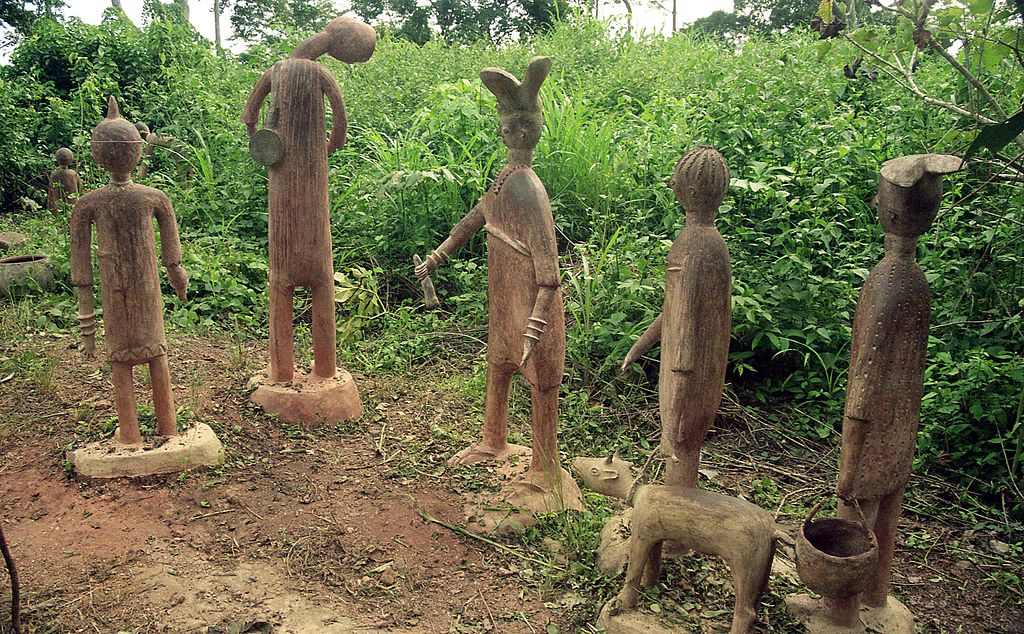
The natural world generally flourishes with life. This wouldn’t have been possible without bodies of water snaking through lush, dense forests, bringing much-needed vitality to all who benefit from it. Nearly every culture associates rivers with something benevolent. After all, they are essential natural resources giving way to life thriving within its banks.
Being the Goddess of Rivers, Oshun is often attributed to being the lifeblood of the Niger River. In fact, her name comes from ‘Orisun,’ which was referred to as being the source of the Niger River. Oshun is also Shango’s favorite wife.
Oshun’s aquatic finesse over the rivers of West Africa immortalized her spot as one of the most critical Orishas. Her blessings ensure that the water remains clean and fishes remain plenty, giving the people a peek into her somewhat empathetic side.
READ MORE: Who Invented Water? History of the Water Molecule
This empathy also means that she is associated with fertility and childbirth. She is strikingly similar to Dionysus, the Greek goddess of wine and fertility. Being involved in marine affairs also implies that she is engaged in rejuvenating the human mind, further solidifying her position. In the Americas, Oshun is regarded as the ‘Orisha of Love.’
However, one thing is for sure. Whichever way she is depicted, she is always shown to be a motherly being with nothing but divine power at her fingertips.
Obatala: the King of Peace
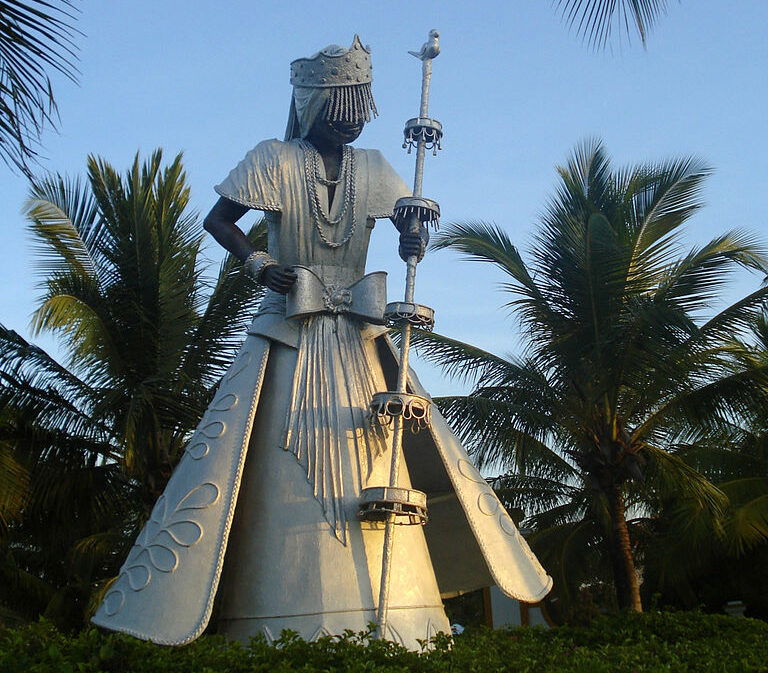
While many Orishas are imaged through physical manifestations such as lightning or rivers, some are connected to deep human affairs. Peace, honesty, and creativity are just some of them.
Garbed in white, the King of Peace Obatala is a merciful Orisha dispatching purity. He is often noted as being the master behind shaping every child when they are within the womb.
His symbols include a white dove and, in more modern times, wreaths of olives due to them becoming a universal sign of peace. Obatala practices a more specific approach to humankind, taking deep care of their psychology while enforcing justice within their affairs.
Oya, the Goddess of Weather
Good weather brings peace to mind momentarily. A great, lasting one makes way for a civilization to flourish. Crops may live or die due to changes in the skies above, and stomachs may be quenched for hunger or thirst. Weather is a fundamental aspect of any significant settlement.
Oya is the Orisha of the weather. Defined as an embodiment of wind, she is Shango’s wife and hence the direct caterer of his will. Besides shifting the clouds, Oya is also connected to tending to the dead. The ‘dead’ doesn’t just include a human being; it consists of the natural world in the sense that dead trees would have to fall to make way for newer ones. Her Slavic god counterpart in Slavic mythology would be Stribog.
So, in reality, Oya really is the goddess of change. Like the weather’s unpredictability, she also commandeers the essence of constantly changing the natural world so it may continue flourishing. Due to this, she also holds domain over psychological qualities such as intuition and clairvoyance.
Obaluaye, the Master of Healing
The concept of regenerative vitality is crucial to every society. No human being is immune to all diseases; however, when there is a chance to heal, it is always welcomed. This duality of vulnerability to conditions and protection against them makes up the next Orisha.
Obaluaye, also known as Babalú Aye, is the Orisha of healing and miracles within the pantheon. Both revered and feared, Obaluaye is well respected by the followers, and he is said to curse you as quickly as he can heal you. Being connected to places such as hospitals where the borders of life and death are frequently grazed.
Obaluaye is also connected to rituals that promote the cure for illnesses. His healing powers range from epidemics to skin diseases and inflammations. This healing power is said to be catered more toward people closer to death.
Yemonja: the Whisper of the Ocean
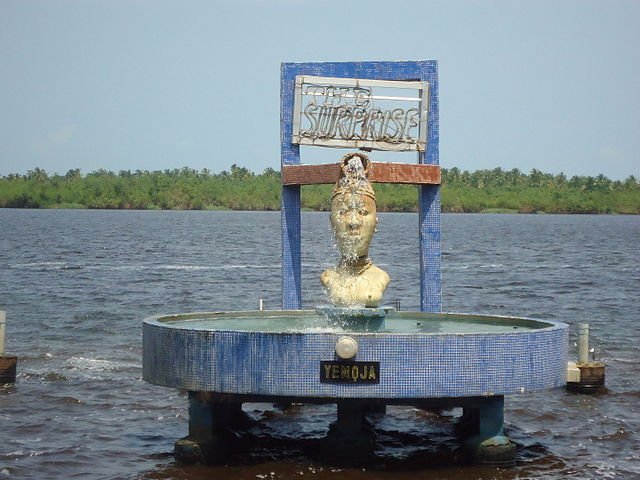
The ocean is vast and seldom cruel, and it is impossible to predict what lies beneath deep waves and endless stretches of water. Such is the need for a motherly figure to watch over all the uncertainty of this blue domain.
Yemonja is the Orisha of the ocean. Not only does she hold control over it, but she also radiates the power of compassion and love. Her watch over the seas sustains life as it is and seals her importance as a motherly figure in the pantheon and the entirety of African mythology.
Speaking of which, Yemonja is the metaphysical mother of all the other gods in the Orisha pantheon. Hence, she is much revered and respected.
Orunmila, the Oracle of Wisdom

The concept of destiny is gazed upon in awe by all those who truly place their faith in it. Destiny is an important notion to believe in because it continually shapes the lifestyle of the individual who lives in its belief.
Orunmila, the Orisha of knowledge, omniscience, and wisdom, is the embodiment of destiny. His purpose might not be material, but it is a psychological one reflected in many African myths.
Human spirits exist within the mind, and hence, tending to its development is what Orunmila really does. He holds power over knowledge, including information, intuition, and instinct. General African myths deal with confusion by introducing a force that counters it. Orunmila is a prime example of it.
His role also extends to the natural world as he knows everything that takes place within it.
Oba, the Flow of the River
Orishas, too, have emotions that flow gracefully like the river. Oba, the Orisha of water and manifestation, is no exception to a story that is best linked to jealousy.
Being the third and the most senior wife of Shango, Oba was one of his consorts. In the pantheon, Oshun was Shango’s favorite wife, which greatly affected Oba. When Oba asked Oshun about what she did to become Shango’s favorite, Oshun simply lied to her (knowing Oba’s children would inherit the kingdom). She said she once cut off her ear, turned it into powder, and sprinkled it into Shango’s food.
Driven by the will to become Shango’s favorite, Oba followed Oshun and sliced off her ear into his food. Naturally, Shango noticed a floating ear in his food and exiled Oba from his abode.
Oba fell to Earth down below and morphed into the Oba river. Interestingly, the Oba river intersects the Osun river at an explosive speed, symbolizing a long-standing rivalry between two of Shango’s wives.
Oba is linked to rivers, marriage, fertility, and restoration.
How Many African Gods are There?
The pantheon of Orishas (traditionally followed by the Yoruba people) is a sequence of divine spirits dispatched by the supreme god Olodumare.
Though a specific number can’t be placed on the amount of Orishas, there is an exciting notion around it. It is said that there are 400+1 Orishas, where the ‘ stands as an incomprehensible number that implies infinity.
There isn’t an exact number, but sometimes it goes up to 700, 900, or even 1440 Orishas. As for the “400+1” concept, the 1 is an incredibly sacred number that tells you that there are countless Orishas, but you will always be one count short if you try to comprehend it.
So you may think about the total as often as you like, but there will always be one more Orisha to consider.
And yes, this does go on forever.
The Concept of a Supreme African God
In African Mythology, the Yoruba people very well received the notion of an omnipotent sky god looking over all things that live on Earth. In fact, it takes the form of Olodumare, a celestial being that transcends the boundaries of space, time, gender, and dimensions.
Olodumare is also known as Olorun, which means “the Almighty.” Although his omnipotence strikes a profound sense of existential authority, the Yoruba people do not have any dedicated shrines or places of worship for him. Part of this is due to the belief that Olodumare is so deific; his mere distance from the human world makes him incredibly detached from their daily affairs.
Olodumare and his Journey Away from Earth
The Lord of the Heavens was not always this distant from the planet riddled with human beings.
It is believed that at one point in time, Olodumare was close to Earth. However, the constant need by human beings for basic things from the sky, such as food, seemed to frustrate him, so he began his journey away from the planet. Since his abode was the skies, he separated them and himself from the Earth and hence controlled the world from a cosmic distance.
It is here where he found the need to create the Orishas. As the emissaries of his power and will, the Orishas were each assigned unique functions, ensuring total order within the planet of Earth.
The Capstone of African Mythology
Most African traditional religions are extraordinarily diverse and range over countless cultures and practices. The Yoruba religion and its beliefs influence human life in both the African continent and other regions.
The Yoruba religion can be marked as a capstone of African beliefs due to its wide acceptance. Of all the African religions, this remains one of the few on the rise. In present-day Nigeria, Yoruba mythology has evolved into a faith where its followers address the gods and goddesses in respect to the complex oral traditions passed down from generation to generation.
The Yoruba people refer to this religion as Ìṣẹ̀ṣẹ. The word itself can be broken down into two parts;”’Ìṣẹ̀” means’ origin’ and ìṣe refers to “practice.” Coming together, Ìṣẹ̀ṣẹ literally means “practicing our origin.” As you can see, this is a beautiful way to honor their roots, as most of their traditions and beliefs spring from their deep-rooted faith in the Orisha Pantheon.
Important themes
A relatively common theme integrated into the Yoruba religion is Animism. Animism refers to the belief that everything (and yes, LITERALLY everything) possesses a spiritual quintessence. Due to this, every object (material or immaterial) is believed to have some sort of sentience.
As a result, they are all controlled within the domains of the Orishas. Like the gods and goddesses of Ancient Egypt and Rome, there is always a supreme being keeping watch over all.
Another belief revolves around reincarnation. The belief in reincarnation is linked to ideas from their ancestors. The notion of reincarnation is that deceased family members make their journey back to life as a new baby in the same family they once departed from.
As a direct result, Yoruba people can sometimes be identified as their departed imprints through visions and likenesses in appearances. To honor this, they are often given names such as “Babatunde,” which means “father returns” or “Yetunde” (mother returns).
These reincarnated figures are usually there to assist their progeny with everyday life and general faith. Hence, dead ancestors remain as relevant as they can ever be even after death.
Additional Resources
The Orishas, https://legacy.cs.indiana.edu/~port/teach/205/santeria2.html.
Dialogue Institute. “Yoruba.” Dialogue Institute, Dialogue Institute, 16 Sept. 2020,
https://dialogueinstitute.org/afrocaribbean-and-african-religion-information/2020/9/16/yoruba .
“Home.” Staff – Works –, https://africa.si.edu/collections/objects/4343/staff;jsessionid=D42CDB944133045361825BF627EC3B4C.